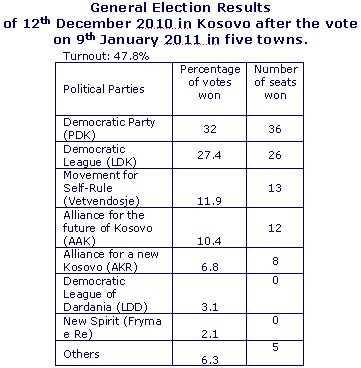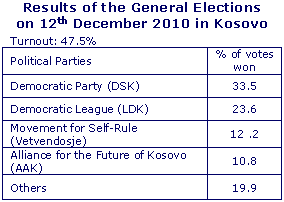News
Corinne Deloy,
Fondation Robert Schuman,
Helen Levy
-

Available versions :
EN

Corinne Deloy
Fondation Robert Schuman
Helen Levy
The Democratic Party (DSK) of outgoing Prime Minister Hashim Thaci won the early elections that took place in Kosovo on 12th December. According to still incomplete results it is said to have won 33.5% of the vote. It came out ahead of its main rival, the Democratic League, led by the Mayor of Pristina, Isa Mustafa which won 23.6% of the vote. The Movement for Self-Rule (Vetvendosje) led by Albin Kurti, which lies to the left and which opposes the presence of foreign troops in the country and supports Kosovo's annexation to Albania came third with 12.2%. It is followed by the Alliance for the Future of Kosovo (AAK) led by Ramush Haradinaj who is in prison at present at the International Criminal Tribunal in The Hague (ICTY), which won 10.8%. However New Spirit (Fryma e Re), a party founded and led by Ilir Deda and Shpend Ahmeti, did not succeed in rising above the 5% threshold necessary to be represented in Parliament.
The final turnout rose to 47.5% i.e. +7.4 points than in the elections of November 2007.
The Serbs living in the enclaves in the South of Kosovo turned out to vote (41% in Gracanica, 48% in Strpce, 50% in Partes and 50.32% in Novo Brdo) whilst turnout was almost zero in Serb areas in the north. Around 120,000 Serbs live in Kosovo. The government in Belgrade, which is still claiming Kosovo as one of its provinces, called for a boycott of the election.
These general elections, the first since the independence of Kosovo (17th February 2008), were considered by the EU and the USA as a test of the country's democratic maturity. The voted was monitored by 32,000 observers, of whom 840 were from abroad, and the police totalled 6,000 men to ensure that the election occurred peacefully.
"Victory is ours! The general elections were a referendum on the European future of Kosovo. The Democratic Party achieved an historic, far reaching and most decisive victory this evening," declared Hashim Thaci when the results were announced. "Kosovo is voting for a European future, for the liberalisation of visas, for a Kosovo that is part of NATO, for integration into the EU and the UN," he said as he went to vote.
"Hashim Thaci's Democratic Party is delighted with the support of a very disciplined electoral base," said Krenar Gashi, journalist and research director for the think-tank KIPRED just before the elections. The loyalty of the DSK's electorate enabled it to fight off the rise of new parties. In spite of the scandals of recent years the Kosovars have remained extremely attached to the DSK which has many former soldiers of the Kosovo Liberation Army (UCK) amongst its ranks, considered as heroes of the country's independence.
The Democratic League, a member of the government led by Hashim Thaci until a few weeks ago, has suffered because of the short electoral campaign and did not have enough time to assert its opposition with regard to its former government partner. However in these elections its leader Isa Mustafa was pursuing a more long term goal hoping undoubtedly to strengthen the LDK than win the ballot at any cost. The Mayor of Pristina knows he will need time to build a party that can convince new voters and which is able to compete against the DSK and its other rivals.
"Albin Kurti was on the sidelines but he was there – he took part. It was already an alternative before and he offers new possibilities in a new situation," declared political analyst Ramush Tahiri. Deputy Chair of the Students Union of the University of Pristina, Albin Kurti was the main organiser of the peaceful demonstrations in the autumn of 1997 and the spring of 1998 in Kosovo. He was then the spokesperson for the Kosovo Liberation Army (UCK) before being imprisoned for two years by the Serbs (1999-2001). On his liberation he took over the leadership of the non-violent nationalist movement and rose up against the presence of foreigners in Kosovo and endemic corruption. "The European Union should send us doctors and economists not policemen and judges. They qualify us as newborn but they throw us into the arena like gladiators. Let them treat us like adults, we can get by on our own" declared Albin Kurti.
With 16% of the vote and 3rd place after his first general election the leader of the Movement for Self-Rule may very well take part in the renewal of the Kosovar political classes.
The next Kosovar government will have a hard task in continuing the construction of the State. It will have to undertake dialogue with Serbia – as hoped for by the European Union and the USA, obtain the liberalisation of visas, normalise the status of the north of Kosovo – a territory which Pristina still does not control – draw closer to the EU and prepare its entry into NATO.
The country's economic and social situation is still precarious: 45% of Kosovars still live below the poverty line 15% of whom are in a dire situation. All of the parties campaigned on the theme of economic recovery, the reduction of unemployment levels (which affects 48% of the working population) and the fight to counter corruption that is endemic in the country. Hashim Thaci has promised to increase wages (up to 50% for civil servants), to build motorways and to negotiate the abolition of visa obligations for Kosovars who want to travel in the EU and the USA. Isa Mustafa focused his campaign on the population's growing discontent as well as the fight against corruption and organised crime.
The two main parties have ruled out forming an alliance for the next government. Therefore they will have to deal with one or several of the 27 parties – of whom 15 represent the country's ethnic minorities – which were running in this election. The Movement for Self Rule and the Alliance for the Future of Kosovo have explicitly said that they do not want to join a coalition dominated by the DSK. "We are going to have a difficult time after these elections because more than two parties are necessary to form a government and in the end there will not be a stable government for the next four years," indicated Ardian Arifaj, journalist at the daily Koha Ditore.
The Democratic Party maintains its lead after the by-elections in Kosovo.
Voters in the towns of Ferizaj-Urosevac, Decan-Decani, Malishevo, Skenderaj-Srbica and Gllogovce-Glogovac were called to vote in by-elections in Kosovo on 9th January after the vote in the election on 12th December 2010 was declared null and void in five towns due to infringements.
The Democratic Party (PDK) of outgoing Prime Minister Hashim Thaci won 32% of the vote, (1.5 point down in comparison with the result achieved on 12th December last). It was followed by the Democratic League (LDK) led by the Mayor of Pristina, Isa Mustafa who won 24.7% of the vote (0.9 point more).
Turn out fell by 22 points in Skenderaj-Srbica and by 27 points in Gllogovce-Glogovac between 12th December and 9th January.
The results of the general election are still not final however since another by-election will take place on 16th or 23rd January in Mitrovica. The votes of the electorate in the country's second biggest town should not lead to any modification in the final results of the election though.
European Parliament observers who were responsible for monitoring the election on 9th January again expressed their concern about the democratic running of the voting. "Serious shortcomings revealed a lack of political determination, including on a local level, to hold elections that fall in line with international standards. Reports of electoral fraud and intimidation were brought to the delegation's attention," declared the European Parliament's rapporteur for Kosovo, Ulrike Lunacek. MEP Jutta Steinruck spoke of a chaotic situation, referring to a polling station in the village of Prekaz where an electricity cut left everyone "in the dark in every sense of the term." "What then happened is not clear for me or for the other international observers," she said.
Hashim Thaci does not seem to have been affected by the accusations of organs trafficking on the part of Dick Marty, the rapporteur for the Human Rights Committee at the Council of Europe. The latter maintains that the outgoing Prime Minister committed "serious crimes against Serb citizens who remained in Kosovo and made them prisoners." He stressed that "the organs are said to have been taken from prisoners in a clinic in Albanian territory near Fushe-Kruje and afterwards they were taken abroad to be used in transplant operations."
The Democratic Party will have to find at least two partners to form a government coalition. The Democratic League has already said that it would not renew its previous alliance with Hashim Thaci. On 28th December the Independent Liberal Party (SLS) accepted to join forces with the Democratic Party; it was said that the United Serb List and the Alliance for a New Kosovo (AKR), led by Behxet Pacolli would complete this coalition before the latter declared that he would not govern with people who were suspected of being criminals asking however to be the government's candidate as President of the Republic (who is elected by parliament in Kosovo) in exchange for his party's participation in the next government coalition. Kosovo will have to wait a little longer – until February at least – before it knows which parties and which men will lead it for the next four years.
 Source : Agence Reuters
Source : Agence Reuters
(Results of 9th January election:http://www.kqz-ks.org/SKQZ-WEB/al/materiale/2011%20Kosovo%20Assembly%20Elections%20-%20re%20runs%20without%20MI.pdf )
On the same theme
To go further
Elections in Europe
Corinne Deloy
—
25 February 2025
Elections in Europe
Corinne Deloy
—
18 February 2025
Elections in Europe
Corinne Deloy
—
28 January 2025
Elections in Europe
Corinne Deloy
—
14 January 2025

The Letter
Schuman
European news of the week
Unique in its genre, with its 200,000 subscribers and its editions in 6 languages (French, English, German, Spanish, Polish and Ukrainian), it has brought to you, for 15 years, a summary of European news, more needed now than ever
Versions :




